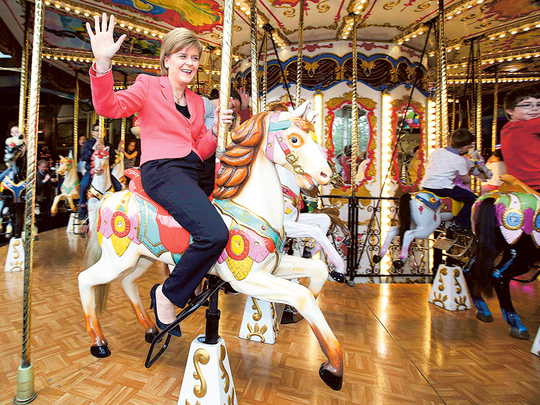
Padstow, UK: The Conservatives are not two percentage points ahead of Labour heading into Thursday’s general election, according to one opinion poll published here yesterday.
No, wait.
Labour has a one point percentage lead over the Conservatives heading into the vote in three days time, according to another poll.
Hang on a minute.
Both main parties are tied for support in the final days of campaigning, according to a third opinion poll published yesterday morning.
Huh? What does it all mean?
“No one knows what’s happening and it’s too close to call anyway,” Tracey Erlandsen, a yoga teacher and real estate agent told Gulf News.
What is certain — other than the pollsters have divided opinions over the current state of support for the main political parties — is that when Britons wake up on Friday and all the votes have been counted, no single party will be capable of forming a government based on 326 or more of the 650 seats in the House of Commons.
But analysts here are predicting the UK will face weeks of political wrangling before either Labour’s Ed Miliband or the Conservative’s David Cameron will be able to take a brief limousine ride from Westminster to Buckingham Palace to inform Queen Elizabeth that they can form her majesty’s next government.
A Conservative and Liberal Democrat coalition — just as ruled Britain or the past five years — is the most credible scenario. But senior Members of Parliament from both parties are reported by the Guardian to have deep reservations about such an outcome, and are said to be planning to force Cameron and the Lib-Dem’s Nick Clegg into gruelling and protracted negotiations that could last well into the summer.
Clegg would face stubborn and hard-fought resistance for a coalition deal that would mean the Conservative abide by Cameron’s redline pledge to hold a definitive “in-or-out” referendum on Britain’s continued role in the European Union.
Senior Lib-Dems fear that a referendum won’t resolve anything, but will merely serve to compound confusion with the issue lingering for years — just as the referendum on Scottish independence, though lost, has left the future of Scotland as a key future issue that must be addressed by any future parliament.
If Cameron can’t do a deal with the Lib-Dems, he may look to the anti-EU United Kingdom Independence Party (Ukip) — who are tipped to win 10 to 12 seats — and the Democratic Unionist party from Northern Ireland, who are likely to have eight or so seats in the new parliament.
Support from those two parties may not be enough for an overall majority but might leave Cameron confident enough that he can form a minority administration. Such an administration would be likely short lived, given Ukip’s desire for a referendum on Europe sooner that the 2017 autumn timetable preferred by Cameron.
A Commons vote on that measure would likely be a confidence issue, meaning that if Cameron and his coalition partners were to lose, the UK would face more uncertainty. Any legislation with finance provisions — deemed a “money bill” — would also be a confidence issue.
A second general election might not, however, have to be called. If Labour felt that it could work with a block of Scottish Nationalist Party MPs, it might try to form an replacement administration. But the party would first have to overcome Miliband’s strong opposition to any deal with the SNP. But, given that he would have failed to lead Labour to a commanding position after Thursday vote, his leadership role in the party may in jeopardy anyway.













